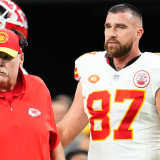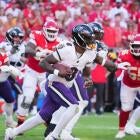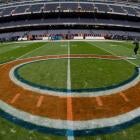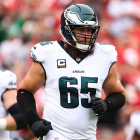NFC North Reset: Packers offense gets even more dangerous, Vikings fix fatal flaws
After a successful offseason, the Packers established themselves as the front-runners once again

Being the best in the North isn't usually a good thing in "Game of Thrones" (spoiler alert: You might want to skip the next paragraph).
Ned Stark was Warden of the North and got beheaded. Rob Stark was King in the North and he (along with his mother, wife and unborn child) was slaughtered at a wedding. Roose Bolton, who held the North after the Red Wedding, was killed by his own son. Ramsay Bolton, who overtook Roose after killing him, was eaten alive by dogs. The fate of Jon Snow is still unknown, but he's situated pretty close to an army of White Walkers, so I'm guessing dark days are ahead for the current King in the North.
And with that ominous warning, we'll begin our NFC North offseason review with the NFL's clear King in the North, the Green Bay Packers, who have won the division five of the past six seasons.
The King in the North gets even better
There's no reason to think the Packers' stunning run of dominance in the division will end next season.
Somehow, the Packers found a way to get even better this offseason. The first -- and most important -- was by landing Martellus Bennett.
A year ago, excitement seemingly peaked when Packers general manager Ted Thompson made a rare splash in free agency by signing Jared Cook. And all of that fuss was about a perpetually unreliable tight end. Packers fans should be losing their minds over Bennett, who replaced Cook.
In Bennett, the Packers gave Aaron Rodgers his best weapon at tight end since … forever. Bennett isn't unreliable like Cook and Jermichael Finley; he has been one of the most reliable tight ends in all of football for the past several seasons. Since 2012, when Bennett first became a No. 1 tight end, he has racked up the sixth-most receiving yards among all tight ends.
Plus, he can do more than catch the ball. He's an excellent, though not flashy, blocker. In 2016, Bennett finished as Pro Football Focus' fifth-highest graded tight end.
He's going to help Rodgers a tremendous amount. Last season, Cook accumulated 553 yards over the Packers' final 10 games (including three playoff games). Bennett should easily eclipse those numbers.
I'm pretty sure Aaron Rodgers doesn't sweat when he plays. It's pretty amazing. Lol.
— Martellus Bennett (@MartysaurusRex) February 11, 2013
Almost as important, they made sure they retooled their secondary. With their first selection in the draft, which came early in the second round, the Packers got a first-round talent in cornerback Kevin King. Pete Prisco gave the Packers an A+ for the pick.
King, at 6-feet-3, is incredibly versatile. At Washington, he played both safety and cornerback. In his final season, as a cornerback, he notched 13 passes defended. According to NFL.com, he surrendered one touchdown over his final 101 targets. Considering the Packers' defense ranked 21st in points allowed and dead last in yards per pass attempt, picking up a first-round defensive back in the second round was incredibly important.
Those were their flashiest offseason moves, but don't overlook their under-the-radar additions. Free-agent defensive lineman Ricky Jean-Francois will bolster their line while second-round pick Josh Jones will help fill Micah Hyde's void. Meanwhile, the late-April addition of guard Jahri Evans is a great low-risk, high-reward signing that could pay dividends.
Make no mistake about it: The rich got richer. After a productive offseason, the Packers are once again the clear front-runners in the NFC North. That doesn't mean they're flawless -- their defense is still suspect, and we'll get to their running game next -- but as long as the Packers have Rodgers, they'll remain the favorites.
The Packers' two bad moves
The Packers didn't have a perfect offseason. They let go of Eddie Lacy and couldn't find a reliable replacement.
Lacy had his flaws -- no one will deny that -- but he was always productive when healthy the past four seasons. He was even good in 2016 before injuries ruined his season, averaging 5.1 yards per carry.
Ty Montgomery will likely spearhead the Packers' backfield this season, and that's fine given how he played last season (5.9 yards per carry), but Montgomery has never been the go-to back for an entire season. The Packers are definitely risking a lot by riding solely with him.
With all that being said, I can't criticize the Packers for how they handled Lacy's departure. They drafted three running backs (Devante Mays, Aaron Jones and Jamaal Williams) in the mid-to-late rounds. I like that approach, because it's better than wasting a top draft pick on a running back or signing an overpriced, aging free agent (see: Jacksonville and New Orleans).
The Packers weren't really left with a clear solution to their running back problem, so they made the sensible decision to draft a variety of project backs and hope at least one turns into a capable player at the next level. Still, it's worth noting that this could be a problematic position for the team in 2017. No team is perfect, even the contenders. This is one of the Packers' flaws.
Another one of their flaws: the offensive line. Last year they let Josh Sitton go and watched him walk on over to Chicago. This year, they let T.J. Lang go and watched him head to Detroit. JC Tretter also left for greener pastures, heading to Cleveland (well, maybe not greener pastures, per se).
Losing two top-caliber guards in Sitton and Lang in consecutive years along with a key lineman in 2016 in Tretter can't make Rodgers happy. Lang finished fourth in Pro Football Focus' pass-blocking efficiency statistic. With the Bears, Sitton finished second in the league.
It's a particularly troubling area of concern, because one ugly hit to Rodgers will effectively end their season.
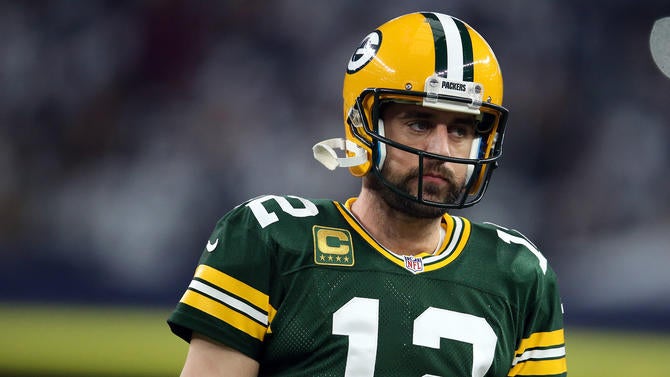
A changing of the guard
Three household names no longer reside in the NFC North. For the first time since 2006, the Vikings' backfield won't be spearheaded by Adrian Peterson, who left in free agency for New Orleans. For the first time since 2008, the Bears' quarterback won't be Jay Cutler, who is Fox Sports' newest NFL analyst. And for the first time since 2011, the Bears' quarterback won't have Alshon Jeffery to rescue jump balls.
We'll get to how the Vikings and Bears replaced those players, but first let's take a moment to recognize how weird an NFC North without those players feels.
OK, moment over.
The Vikings' new two-headed running game
So, the Vikings did pretty alright replacing Peterson. First, they went out and signed former Raiders running back Latavius Murray. Murray isn't flashy and, to be frank, he might not be that great, but he's a workhorse. At the time, I wasn't a huge fan of the signing because Murray has averaged 4.2 yards per carry in his career, but after the draft, I became a fan.
That's because the Vikings drafted Dalvin Cook in the second round. Now, personally, I would not have drafted Cook due to his issues away from the field, but I don't run the Vikings, and the Vikings didn't appear to be bothered by Cook's ugly history. So, let's look at this from a pure football perspective.
Cook was easily a first-round talent based on his football production. In his three-year career at Florida State, Cook averaged 6.5 yards per carry and scored 48 touchdowns. I'm fully expecting him to eventually emerge as the top running back, but I like the idea of the Vikings using a split backfield.
Put it this way: The Vikings' running game can't be any worse than it was last season, when it averaged a league-low 75.3 yards. So there's nowhere for the Vikings' running game game to go but up.
The Vikings bolster their protection
Another reason the Vikings can expect improvement on the ground: They upgraded their offensive line, which was just as much of the problem as the running backs. First, they upgraded at tackle by landing Riley Reiff and Mike Remmers. Neither of them are saviors, but -- again -- they're upgrades. Then they went out and drafted center Pat Elflein in the third round.
The improved line should also help quarterback Sam Bradford. The Vikings allowed 38 sacks last season, 10th most in the NFL. Bradford still managed to produce the second-highest passer rating when under pressure, according to PFF, but he was under pressure 33.1 percent of the time. That number needs to drop.
And it should. Last season, Vikings tackles T.J. Clemmings and Jeremiah Sirles ranked in the bottom 10 in PFF's pass-blocking efficiency metric.
Again: Reiff and Remmers aren't perfect. I fully expect the Vikings' line to experience its issues again. Hopefully, for Bradford and the running game's sake, the issues just aren't as pronounced.
The Lions try to fix their defense
The Lions almost won the division last season but fell short in their Week 17 duel with the Packers. It's clear that if they're going to get over the hump, they're going to need to bring a much-improved defense to the field. A year ago, the Lions ranked last defensively in DVOA.
Here's how they addressed that problem in the offseason:
- They drafted Florida linebacker Jarrad Davis in the first round
- They drafted Florida cornerback Teez Tabor in the second round
- They used four mid-to-late-round draft picks on defensive players
- They signed free-agent defensive end Cornelius Washington
In Davis, the Lions now have a rangy linebacker who will replace the departed DeAndre Levy. In Tabor, the Lions got a cornerback who snagged seven picks the past two seasons. And in Washington, they got a defensive end who was just beginning to blossom with the Bears -- a project player, coached up by Bears defensive coordinator Vic Fangio, who notched two sacks last season. He has a ton of potential.
But I'm not sure the Lions did enough to fix the problem. If Davis and Tabor turn out to be great players, then the Lions will be fine. But nobody ever knows if draft prospects will turn into anything at the next level.
I'm expecting a regression from the Lions. A year ago, they had a minus-12 point differential. That's not the sign of a good team. That's the sign of a lucky team. And I just don't think they did enough to fix their flaws this offseason.
I will give them credit for one great move: stealing Lang. That should help bolster their offensive line.
So, where do the two chasers stand?
The Vikings, not the Lions, are best positioned to overtake the Packers. They didn't go crazy this offseason. They didn't really have a flashy offseason. And that's OK.
Remember: Last year, the Vikings leapt out to a 5-0 record before stumbling down the stretch. Injuries had a lot to do with their demise. If the Vikings' offensive line and defense can remain relatively healthy, they have a chance to hang with a Packers team that will be relying entirely on its offense to carry the load. At the minimum, they should be in the wild-card discussion.
As for the Lions, well, at least they're not the Bears.
Rebuilding Bears go all-in on Trubisky
In the depths of the division are the Bears. They don't have a shot in hell at competing for a playoff spot. Instead, this year will be almost entirely about how their young players develop.
We need to, of course, start with their quarterbacks. The Bears moved on from Jay Cutler by giving Mike Glennon too much money and the 49ers too much draft ammunition for the right to draft Mitch Trubisky. But it won't be Trubisky who starts the season under center. It will be Glennon.
That could be important. If Glennon plays well, the Bears could potentially try to trade him to a quarterback-needy team. The most likely scenario sees the Bears moving on from Glennon after the season -- his contract allows them to -- and handing the job over to Trubisky.

But this year will be important for Trubisky's development. The Bears would be wise to let him sit on the bench and learn. Take it from Cutler, a quarterback who knows about the downsides of playing for a bad team.
"If it's going downhill, I don't really see any reason to play the kid," Cutler told ESPN Radio last week, via PFT. "I'm sure there's going to be a lot of people calling for his name, because you draft him at No. 2 and draft him for a reason, and that's to play football and win games. But if you look at a lot of quarterbacks throughout this league, until you've got some people around you, some pieces around you, it's hard to win football games in this league as a quarterback. If it's going downhill, there's no way I'm playing him. For what? So he can go out there and take a beating and he can get off to a rough start as an NFL quarterback?"
General manager Ryan Pace bet his job on Trubisky's development. He shouldn't ruin it by letting Trubisky get hammered on a bad team.
The Bears' buy-low, high-reward signings
Aside from Pace's horrible trade to get Trubisky, he had an otherwise productive offseason. Pace knows his team is still a year or two away from seriously competing, so he didn't go out and sign costly, aging free agents. Instead, he acquired cheap talent, all of whom feature considerable upside.
There's tight end Dion Sims, safety Quintin Demps, cornerbacks Prince Amukamara and Marcus Cooper and defensive lineman Jaye Howard. The Bears just need to hit on two or three of those players for those moves to have been worth it.
Meanwhile, with his remaining draft picks, Pace took players who might need some time to develop. Tight end Adam Shaheen played college ball at Ashland, while running back Tarik Cohen and guard Jordan Morgan come from North Carolina A&T and Kutztown. Meanwhile, fourth-round pick safety Eddie Jackson fractured his leg last season at Alabama.
The good news? The Bears definitely have time to let those players develop. They're not winning much of anything this season.


